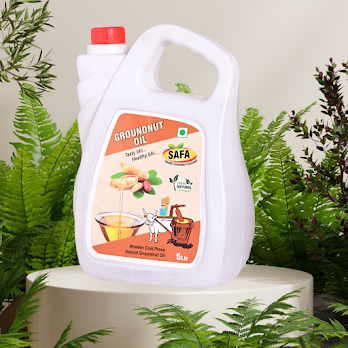Safa Foods is a company that offers pure and natural cooking oils made through the traditional method of wooden cold pressing. This process helps to preserve the oil's natural flavour and nutritional properties, and is more eco-friendly compared to other oil production methods. Safa Foods currently produces Groundnut, Sesame, and Coconut oils, with plans to add more products in the future. The company's products may seem expensive, but its emphasis on health benefits makes it a good investment.
Friday, February 24, 2023
Saturday, February 4, 2023
How refined oil is manufactured and why is it harmful to our health?
Case Study on Wooden Cold Pressed Oil
Wood pressed oil for cooking.
Wood pressed oil can be used for a variety of cooking methods, including:
Disadvantages of cold pressed oil.
Disadvantages of cold-pressed oil:
History of wooden cold pressed oil.
Wooden cold pressed Sesame oil benefits.
Wooden cold-pressed sesame oil is considered to have the following benefits:
Wood pressed coconut oil benefits.
Wooden cold-pressed coconut oil is considered to have the following benefits:
- Nutritional value: It is considered to retain the natural flavor, aroma, and nutrients of the coconut that is used to extract the oil.
- Chemical-free: Unlike other oil extraction methods, cold-pressed oil is made without the use of chemical solvents or high heat, making it a healthier option.
- Good for heart health: Coconut oil is rich in medium-chain fatty acids, which are believed to promote heart health by improving cholesterol levels and reducing the risk of heart disease.
- Good for skin and hair: Coconut oil is known for its moisturizing properties and is believed to be beneficial for skin and hair health.
- Supports weight loss: Coconut oil is believed to aid weight loss by promoting feelings of fullness and reducing calorie intake.
- Supports brain function: Coconut oil is believed to improve brain function by providing an alternative source of energy for the brain in the form of ketones.
- Supports immune system: Coconut oil is rich in lauric acid, which is believed to have antimicrobial and antiviral properties that support the immune system.
- Supports sustainable agriculture: Cold-pressed oil production supports traditional and sustainable farming methods, which is important for maintaining biodiversity and preserving the environment.
- Long shelf life: Wooden cold-pressed coconut oil has a longer shelf life compared to other oils due to its chemical-free extraction process.
Wood Cold pressed groundnut oil benefits.
Wood cold-pressed groundnut oil is considered to have the following benefits:
Process of cold pressed oil.
Process of cold pressed oil involve following steps:
Wood pressed oil vs refined oil
Wood Pressed Oil Vs Refined Oil
Wooden Cold Pressed Oil benefits.
Wooden cold-pressed oil is considered to have the following benefits:
2. Chemical-free: Unlike other oil extraction methods, cold-pressed oil is made without the use of chemical solvents or high heat, making it a healthier option.
3. Long shelf life: Wooden cold-pressed oil has a longer shelf life compared to other oils due to its chemical-free extraction process.
4. Aids digestion: Some types of cold-pressed oils such as sesame and mustard oil are considered to aid digestion and improve gut health.
5. Good for skin and hair: Cold-pressed oils such as coconut, olive, and avocado oil are believed to have moisturizing properties that are beneficial for skin and hair.
6. Supports sustainable agriculture: Cold-pressed oil production supports traditional and sustainable farming methods, which is important for maintaining biodiversity and preserving the environment.
How To Start Cold Pressed Oil Business?
How To Start Cold Pressed Oil Business? Starting a wooden cold pressed oil business requires careful planning, research, and investment. He...
-
How To Start Cold Pressed Oil Business? Starting a wooden cold pressed oil business requires careful planning, research, and investment. He...
-
The history of wooden cold-pressed oil dates back thousands of years and has been used for both culinary and medicinal purposes in many cul...
-
Wood pressed oil can be used for a variety of cooking methods, including: 1. Sauteing: Cold-pressed oil can be used for sauteing vegeta...





